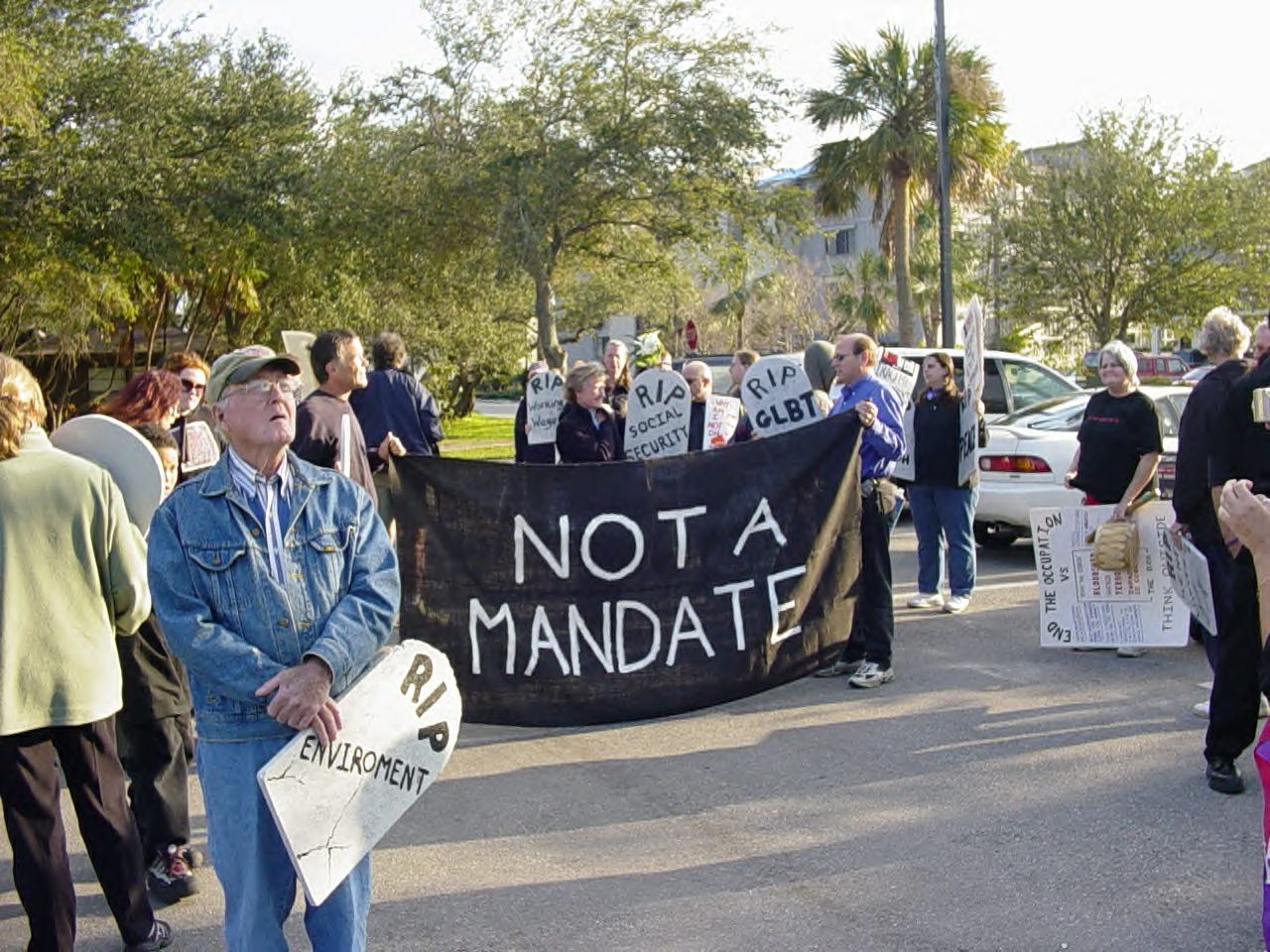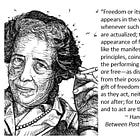Some would have us believe that the failure of the peace movement to prevent the 2003 Iraq War negates that movement’s value or importance—that it was an obvious failure, a meaningless waste of time and effort. Such a view evidences an impoverished moral imagination and absurdly narrow conception of the human condition.
Such an assessment of humanity’s largest day of mass protest, on February 15, 2003, and the wider sustained movement rests on a set of beliefs that, if consistently adhered to, would thwart the possibility of social change. The movement rekindled and ignited the ethical-political conscience of millions and became a catalyst for activism in a number of domains related to but also distinct from the Iraq War. The movement also exemplified the best of humanity, and if we look closely, teaches us to value the intrinsically good in life.
Though we failed where we wished most to succeed, the movement spurred significant social change efforts on a host of issues. We activated our political agency, gained knowledge about government and power, and developed community relationships. Many of us gained vital political knowledge, learned how to do local political organizing. We can get a sense of the galvanizing effects the peace movement had by looking at Brevard County, Florida.
Brevard County is colloquially referred to as the “Space Coast” since one of its cities, Cape Canaveral, hosts the Kennedy Space Center. The county also includes the cities of Palm Bay, Melbourne, Titusville, and Cocoa Beach, famous for surfing and the Ron Jon Surf Shop. The character of Brevard’s politics during the 2000s is best indicated by the fact the self-described Christian conservative, Dave Weldon, represented county residents in the U.S. House of Representatives for fourteen years. Weldon was first elected in 1994 during the "Republican Revolution," and went on to be reelected for six more consecutive terms.
During his tenure in office Weldon voted to ban gay adoptions, oppose same sex marriage, and even prevent protecting job discrimination based on sexual orientation. Weldon, who is seeking election in 2024 for a Florida House, also voted for the authorization of use of force in Iraq and consistently supported the Bush administration’s war efforts. In 2007, I was among a small group of peace activists who were granted a meeting with Weldon. After I brought up Rev. Dr. King’s contention that a nation that spends more money on military defense than on social programs risked spiritual death, Weldon responded by telling us he thought defense spending was not high enough. He added that he would shut down the Federal Department of Education if he had the power to do so.
Weldon voted for the 2001 Patriot Act and sought to prevent it from sunsetting. He also advanced anti-abortion positions and led the challenge of the Food and Drug Administration’s 2003 approval of the over-the-counter sale of the morning after pill for all ages. Weldon’s efforts helped result in a decade-long delay of the over-the-counter sale of the pill for all ages and a three-year delay on its availability to adult women without a prescription.
Our 2003 peace activism, conducted under the simple moniker “Patriots for Peace,” drew many people who felt disempowered and marginalized by the dominant thrust of politics in their community. People who had never done more than to vote in presidential elections participated in marches, rallies, and vigils. Many others joined us who had been politically-civically dormant for years. They made signs, registered to vote, tuned into independent media, gave speeches, signed petitions, wrote letters to their editors, and called elected officials. They raised their voice in civic dialogue with friends, family members, and neighbors about public policy and local, state, and federal government. During the reoccurring vigils held for the war dead at the “Peace Corner,” it was not uncommon for passersby to park in the nearby parking lot and ask us what we were doing and who we were. People who felt left out of democracy discovered a role in civic life beyond voting for a predetermined candidate.
Peace advocates became involved in local elections as candidates, campaigners, and voters. In 2002 and 2004, Dave Weldon won reelection with more than 60% of the vote. In 2006, peace activists helped anti-war veteran, Robert Bowman, give Weldon his most competitive election in several terms. Bowman garnered 44% of the vote despite being outspent six-to-one, no serious support from the larger Democratic party apparatus, and Weldon’s refusal to debate his opponent. Another peace advocate, Michele Paccione, succeeded in serving as a city council member in Palm Bay for eight years, between 2008 and 2016.
The local peace movement helped foster relationships and grassroots activist networks centered around shared values. Together we worked to advocate for gay and lesbian rights, freedom of expression, the separation of church and state, women’s reproductive rights, and rebuffed local policies inhumanely targeting immigrants. In 2004, local peace activists created a new grassroots group, the Space Coast Progressive Alliance, and later worked to bring the independent news show, Democracy Now!, to the local public radio station. We conducted public teach-ins about the dangers of the Patriot Act and government surveillance. In October 2004 we held one of the region’s first public protests in support of marriage equality, countering a local rally advocating a ban on same-sex marriage through the Federal Marriage Amendment.

In 2006, we joined with civil rights leaders in urging the city of Melbourne to rename a prominent road in honor of Rev. Dr. Martin Luther King, Jr. (A battle that would not be won until 2019.) Local peace activists even helped reform Brevard County public school’s abstinence only sex-education curriculum, in 2007. The peace movement succeeded in stimulating political agency and participation in our local community, and it stands to reason that this happened all across the country and world.
Our activism also helped bring to light unlawful surveillance taking place at the local and national level. Following a 2004 peaceful protest of the inauguration of President Bush for a second term, we learned that local law enforcement had infiltrated and video-recorded our action. Police took photos of individuals and license plates at the protest, in Melbourne, where we carried Styrofoam headstones and ceremonially buried the rights we believed were threatened by Bush’s reelection.

The documents obtained by the local chapter of the American Civil Liberties Union (ACLU) showed that I was listed as a “suspect” and given an FBI number while others were listed as persons of interest. Public scrutiny and legal challenge led local city and county law enforcement to adopt new policies respecting resident’s First Amendment rights.
We soon learned that the local policing efforts were part of a larger national program of surveillance at work. Local law enforcement around the nation had been targeting peace actions taking place in counties that had U.S. military installations, and submitted the collected intelligence to the Pentagon’s “Threat and Local Observation Notice” program, TALON for short. Our action took place at Melbourne City Hall, some 15 miles from Patrick Space Force Base. The ACLU filed Freedom of Information Requests on behalf of peace groups and individuals such as myself who were named in the surveillance documents. In 2006, PBS's David Brancaccio interviewed me at my home in Palm Bay about my experience being swept up in the government spying program. Following scrutiny and public outcry in the national press, the Pentagon admitted the program was flawed and brought it to a halt.
None of these outcomes justify or negate the horrors of the war the peace movement was unable to prevent. The good that came with the peace movement could never be ethically purchased at the cost of the deaths of so many innocents. The point is that we must not allow a reductionist thinking about the nature of social change to prevent us from recognizing the good the peace movement contributed to, even as if fought a losing battle to prevent and then stop the Iraq War.
Many around the world were ethically-politically awakened by the rallying cry for peace against an irrational and destructive war. Even as we were dispirited by our inability to stop the war—to prevent so much unnecessary killing—many of us were nevertheless emboldened to exercise our newfound ethical-political agency, our feeling of being members of a democratic society where we could gather with others and work on common causes. The peace movement thus became a catalyst for many to organize around and advocate for civil liberties, human rights, non-violent conflict resolution, and creating a culture of peace. Such indirect and direct effects on politics and culture are enough to show the falsity of the claim the peace movement accomplished nothing.
Read Part Two Below:
If you enjoyed this post please share it with others and like it by clicking the heart icon. Be sure to subscribe if you haven’t already.
Invite Dr. Nall to Speak
Dr. Nall delivers energetic live presentations and engaging workshops on the subjects featured in Humanities in Revolt. Those interested in booking a workshop or talk can get in touch through Facebook or by leaving a comment.





